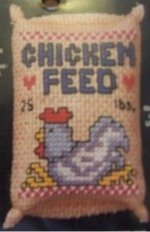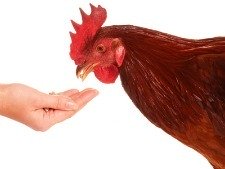Feeding Chickens
When feeding chickens you need to make sure you get the right information. I spent hours searching for information and came away more confused than when I started.
All I wanted to do was go to my local feed store and buy a bag of chicken feed. But, there were so many different types of chicken feed I could not figure out which was best for my chickens.
Well after raising my own chickens for awhile I finally figured it out.
I discovered it depends on six things:
- Are the birds free ranged?
- Are the birds confined to a chicken coop
- What is their age?
- What are your birds purpose?
(egg laying, meat)
- The season?(spring,summer,fall,winter)
There are two schools of thought when it comes to
feeding and care of chickens:
- Making your own feed.
- Buying commercial feed.
Most commercial producers mix their own chicken feed. Some backyard chicken backyard chicken owners do also but we do not recommend this when feeding chickens.
Mixing your own feed has two drawbacks:
- It is easy to make mistakes and not provide the proper
nutrients, vitamins and supplements for feeding chickens.
- It takes a lot of time vs commercially produced chicken feed.
So the question is What do I feed my chickens? First, let me say everybody has something to say about feeding chickens and it is not all the same. I have come to the conclusion that the feeding and care of chickens is simple, if you follow a few basic guidelines and try not to get overwhelmed with all the information that's out there.
When in doubt always ask your local county extension agent. The people involved with your county extension service have years of experience and research to help you with raising chickens.
Besides, your taxes help pay their cost, so use it. Anyway there is a nice article written by Dr. Tom W. Smith Jr.,PH.D., Emeritus Professor of Poultry Science, Mississippi State University on how to properly feed chickens.

Poultry feeds are referred to as "complete" feeds because they are designed to contain all the protein,energy, vitamins,minerals, and other nutrients necessary for proper growth, egg production, and health of the birds.
Feeding chickens any other ingredients, mixed with the feed or fed separately, upsets the balance of nutrients in the "complete" feed. Feeding additional grain or supplement with the complete poultry feed is not recommended .For supplements added to feed click here.
Supplement mistakes:
- Using the wrong medication.
- Using medication when it is not necessary.
- Providing vitamins and electrolyte supplements for more than 10 days.
- Supplementing complete feeds with cracked corn, oats, or other grains.
- Adding too much lettuce, kale or other products that have little or no nutritional value.
Young chickens or broilers kept for meat production are fed differently from pullets saved for egg production.
Broilers have larger bodies and gain weight more rapidly than do the egg producing types of chickens. Therefore, these birds are fed diets with higher protein and energy levels.
Go here for a feeding schedule and a list of nutrients and ingredients
If saved for egg production, broiler hens make poor egg producers. Then consume more feed than Leghorn-type hens and produce fewer eggs.
There are five different classes of nutrients used in today's commercially produced food. The ingredients are mixed in different amounts (no one ingredient can supply the need to make up a complete diet).
The ingredients are mixed in different amounts (no one ingredient can supply the need to make up a complete diet).
For more definitions of everything chicken go to the chicken glossary page.
One other thing people ask about is medicated feeds. Poultry feeds are available with several types of medications for preventing or treating diseases
Okay, so we have our chicken feed. Now we need to know how much to feed. How much your chickens eat depends on:
- Time of year.
- Temperature.
- Age of chicken.
- Size of the chicken.
- Weight of the chicken.
- Amount of eggs laid.
- Type of poultry feed.
Always be aware of how much your chickens are eating. Sometimes chickens may not be getting enough feed. Several things can effect this:
- Partial or hard molt.
- Low in peck order.
- Hot weather.
- Texture(not to dusty or powdery).
- Moldy or musty rations( this can kill a chicken).
- Chickens are not getting enough
water.
If you suspect your chickens are not eating enough, try adding a little variety to their diet. Start by feeding chickens at different times during the day. Try these:
- yogurt
- Milk.
- Cottage cheese.
- Tomatoes.
- Salad greens.
- Stir a small amount of water into their mash.
If you are not successful in stimulating your chickens appetites, your chickens may be in poor health.Check out our chicken health section.
On the other end of the spectrum, if your feed is disappearing too fast something is surly wrong. Some possible things are:
- Chickens infested with worms (take a fecal sample to your vet).
- Your chickens may be too cold (eliminate drafts).
- Other animals (rodents, opossums, etc.)
There are two methods for feeding chickens. To find out more click here.
Chicken feed is usually your largest expense when raising chickens, to help keep feed cost down you can supplement their diet with table scraps etc. To see a list of the things chickens like to eat click here.
Follow these guidelines feeding chickens, and you will have happy and healthy birds. Too much of this stuff can have a negative impact on a birds health.
- Stay away from potato peels, (chickens can't digest easily).
- Spoiled and rotten food will make a chicken sick.
- Fish, onions, and garlic will give your laying hens eggs an unpleasant flavor.
A great alternative is to put these in your compost. To learn more about composting visit www.organic-veggie-patch.com.
If you have the space letting your chickens roam freely will not only reduce your chicken feed bill, but it is one of the most beneficial things you can do for your birds. Always be aware of predators.
Go to our chicken predators page for more information.
If you will practice good food storage techniques, you can reduce your feed cost and avoid feeding your birds bad feed.
Buying chicken supplies online is usually a good idea, because of the wide selection and reasonable prices( most places). But, one thing that does not make any sense buying online is chicken feed.
The shipping cost is usually more than the feed itself. If there is anything wrong with the feed, its just to much of a hassle dealing with it. Plus its a good idea to establish a relationship with a local feed supplier.
The most important nutrient in any
feeding chickens program is WATER.
I am not going to bore you with all the reasons why water is important for chickens. I pretty much think that most people get it. But, Understand that chickens need fresh clean water at all times.
They drink one to two cups of water everyday. Chickens do not like it when water is too hot, so keep it in a shaded area and provide at least three different water stations (Murphys Law). In very cold climates make sure water does not freeze. Their are many products to keep water from freezing.
To learn more about chicken waterers click here.
Water should be changed frequently to prevent bacterial growth. Make sure you clean your waters once a week with a chlorine bleach solution.


New! Comments
Have your say about what you just read! Leave me a comment in the box below.